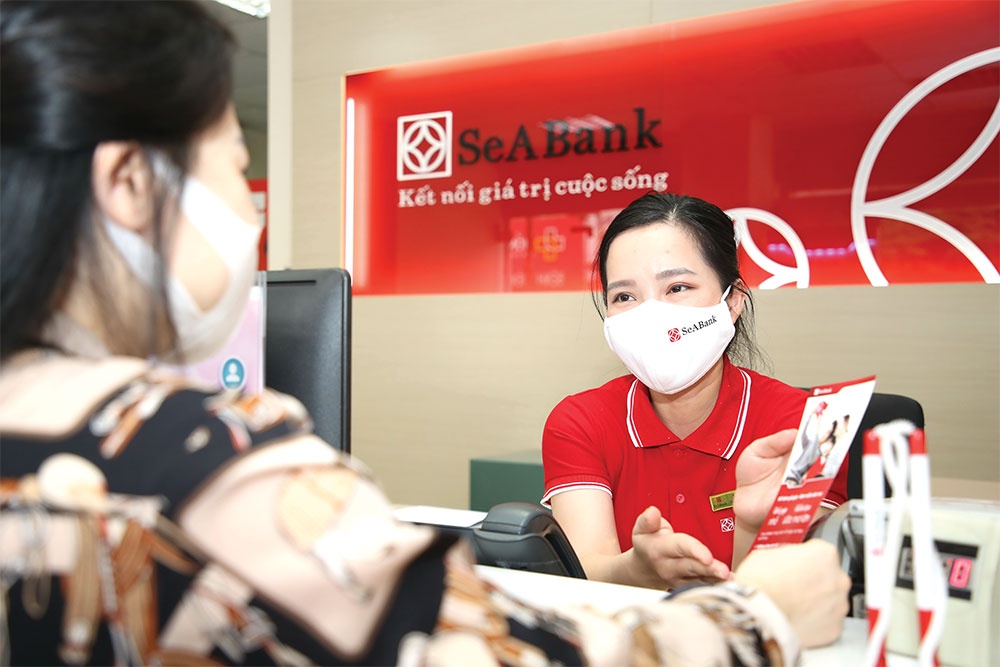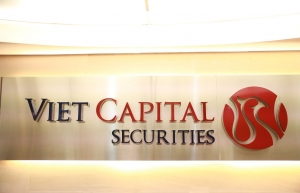Ratings upgrades auger well for long-term progress
The credit rating business has also upgraded the counterparty risk ratings and risk assessment of seven banks, opening new possibilities for low-cost capital access.
 |
| SeABank is among eight lenders that had foreign currency deposit ratings boosted, Photo Le Toan |
The eight banks – Vietcombank, BIDV, OCB, SeABank, TPBank, Agribank, VIB, and VietinBank – had their local and foreign currency deposit and issuer ratings raised by one notch, from Ba3 to Ba2.
BIDV and six other banks (Agribank, VietinBank, ABBank, LienVietPostBank, SHB, and MSB) also had their local and foreign counterparty risk ratings and risk assessment raised by one notch.
Amid the complex international situation leading to over 30 rating downgrades globally over the past eight months, Vietnam is the only country in Asia-Pacific and one of four globally to record a ratings upgrade by Moody’s since the beginning of 2022.
According to Truong Hung Long, director of the Ministry of Finance’s Department of Debt Management and External Finance, Moody’s upgrade of Vietnam’s sovereign credit rating demonstrates the country’s improved policy effectiveness, growing economic strength, and resilience to external macroeconomic shocks.
“The credit rating is the reflection of international investors or lenders’ assessment of the debt repayment ability of a country,” Long said. “Therefore, an upgrade means borrowing costs will decrease for both public and corporate sectors when entering the market.”
Vietnamese banks in recent years have been increasingly choosing to raise capital in the international market. In July, Techcombank raised more than $1 billion in syndicated loans from overseas. The bank entered the international syndicated loan market in October last year with a loan worth $800 million.
In mid-June, the International Development Finance Corporation approved a $200-million loan for SeABank. In April, VPBank also successfully mobilised a $600-million international syndicated loan, with a term of three years.
The previous month, the Asian Development Bank (ADB) and VIB announced a $260-million syndicated loan agreement. A 3-year unsecured loan – including a direct loan of $100 million from the Asian Development Bank (ADB) and a syndicated loan of $160 million that the ADB and United Overseas Bank, co-arranged from nine financial institutions in Asia – aims to enhance financial access for small- and medium-sized enterprises and promote financing for individual home purchases and repairs.
According to some experts, international loans not only help save capital costs but also enable banks to better meet the increasing demand for longer-term loans in domestic and foreign currencies. Accordingly, enhanced access to the international capital market is crucial for banks to gain momentum for the rest of the year and beyond.
A representative from SeABank told VIR, “Moody’s continued upgrading of SeABank reflects the rating agency’s optimism over the bank’s ability to weather economic storms and other external macro changes. At the same time, it seeks to establish SeABank as a frontrunner in adhering to the highest international standards and effective governance, and in reassuring clients and partners, particularly foreign organisations, of the bank’s prestige and potential.”
Phung Xuan Minh, chairman of Saigon Ratings, told VIR, “Moody’s decision illustrates Vietnam’s credit resilience amid the boom-and-bust cycle. The Vietnamese government’s increasing support to assist banks is reflected in Moody’s ratings upgrade. There are also some possible upbeat implications for the domestic banking sector upon the upgrade, particularly easier access to cheaper capital. Resources from overseas lenders have become an increasingly crucial element of funding for domestic banks.”
According to Mirae Asset Securities, the present price range of banking stock is attractive for long-term investors, particularly lenders with solid asset foundations and sustainable development prospects. Nevertheless, bad debt relating to corporate bonds and debt restructuring should always be taken seriously.
BSC Securities, commenting on the future of the banking industry, said that the group’s valuation remains appealing at present and that investors should think about allocating the group to their portfolios. There is a wide range of potential drivers that may cause banking equities to outperform the VN-Index.
SSI Research also shared this bullish outlook on the banking sector.
“Risks associated with reorganising and reclassifying debts may not be a problem for large financial institutions. Given that banks’ pre-tax earnings are still expanding strongly in the second half of 2022, particularly in the third quarter, we predict that the likelihood of a severe drop in banking stocks in this period is minimal,” the brokerage said.
 | Moody's assigns Ba2 rating to Vietnam on back of efficient economic policies Moody's, one of the big three credit ratings agencies, has upgraded the Vietnamese government's long-term issuer and senior unsecured ratings to Ba2 from Ba3. |
 | FiinRatings assigns Viet Capital Securities ICR rating of A- FiinRatings has announced that it has assigned a first-time, long-term issuer credit rating of A- to Viet Capital Securities JSC (VCI) with an outlook of Stable. |
What the stars mean:
★ Poor ★ ★ Promising ★★★ Good ★★★★ Very good ★★★★★ Exceptional
Related Contents
Latest News
More News
- Private capital funds as cornerstone of IFC plans (February 20, 2026 | 14:38)
- Priorities for building credibility and momentum within Vietnamese IFCs (February 20, 2026 | 14:29)
- How Hong Kong can bridge critical financial centre gaps (February 20, 2026 | 14:22)
- All global experiences useful for Vietnam’s international financial hub (February 20, 2026 | 14:16)
- Raised ties reaffirm strategic trust (February 20, 2026 | 14:06)
- Sustained growth can translate into income gains (February 19, 2026 | 18:55)
- The vision to maintain a stable monetary policy (February 19, 2026 | 08:50)
- Banking sector faces data governance hurdles in AI transition (February 19, 2026 | 08:00)
- AI leading to shift in banking roles (February 18, 2026 | 19:54)
- Digital banking enters season of transformation (February 16, 2026 | 09:00)

 Tag:
Tag:



















 Mobile Version
Mobile Version